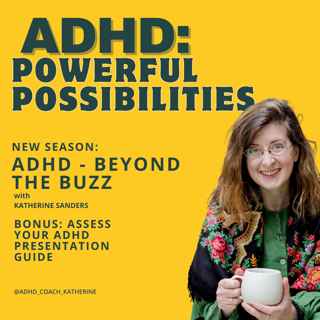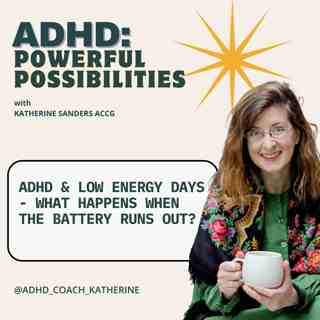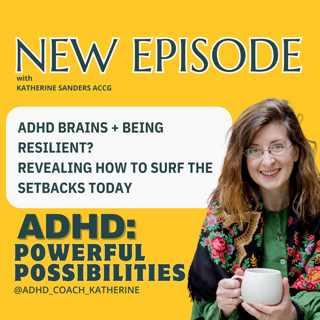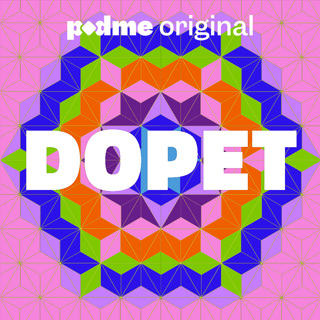
The world's shortest ADHD podcast episode? The ONE THING I want you to know.
ADHD Coach Katherine Sanders In the world's shortest ADHD Podcast episode, I'm sharing the ONE THING that my teen said they wanted people to know about ADHD. It's not what I was expecting.I mentioned in the 'episode' some evidence of the power of our mind or thoughts on our body - and vice versa. Of course, I'm referring to the studies by Professor Ellen Langer, a leading psychologist at Harvard.Her famous 'Counter Clockwise' study showed that our physical environment not just affects our thoughts but can change our body. The team at Harvard are also working on the use of mindfulness (not THAT kind of mindfulness) on Multiple Sclerosis, Parkinsons, diabetes and more.Connect with Katherine here:WebsiteInstagramTiktokFacebookYoutubeLinkedINThreads My website - with links to the Launch Coaching & PEERS social skills group.My Procrastination 101 Guide.Demers, Marika & Pagnini, Francesco & Phillips, Deborah & Chang, Brianna & Winstein, Carolee & Langer, Ellen. (2021). Beta-Testing of an Online Mindfulness Program Designed for Stroke Survivors and Their Caregivers During a Pandemic. Archives of Physical Medicine and Rehabilitation. 102. e37. 10.1016/j.apmr.2021.07.569. Park, Chanmo & Pagnini, Francesco & Langer, Ellen. (2020). Glucose metabolism responds to perceived sugar intake more than actual sugar intake. Scientific reports. 10. 15633. 10.1038/s41598-020-72501-w. Pagnini, Francesco & Bosma, Colin & Phillips, Deborah & Langer, Ellen. (2014). Symptom changes in multiple sclerosis following psychological interventions: A systematic review. BMC neurology. 14. 222. 10.1186/s12883-014-0222-z.
19 Jun 20242min

ADHD and low energy days: what happens when your battery runs out?
ADHD Coach Katherine Sanders Today's episode is different: what happens when our energy runs out?I wanted to share with you the how I responded to a day of zero energy and why I think it's important for ADHD Coaches - and coaches in general - to show up as real humans who have days where our personal growth shows up as love, compassion and permission instead of shiny routines, perky planners and catchy phrases in pep talks. (My clients will confirm I never use any of those...)There are a few research studies that are relevant, showing that ADHD adults are more likely to report fatigue and experience low energy but the questions for today are simple:What do I NEED? How can I meet that need? What people, resources, skills are available to me?How can I show myself compassion and adaptability?I hope you enjoy this different episode - I know I liked sharing something personal and more coach-like with you.Remember to let me know if you have questions - I'll be making a series of 5-10 minute episodes soon to answer them. The website form has had a makeover so head to the podcast page and send them through there.Connect with Katherine here:WebsiteInstagramTiktokFacebookYoutubeLinkedINThreads Podcast Question form: https://lightbulbadhd.com/podcast/Takanobu Yamamoto, The relationship between central fatigue and Attention Deficit/Hyperactivity Disorder of the inattentive type, Neurochemical Research, 10.1007/s11064-022-03693-y, 47, 9, (2890-2898), (2022).Martin Oscarsson, Martina Nelson, Alexander Rozental, Ylva Ginsberg, Per Carlbring, Fredrik Jönsson, Stress and work-related mental illness among working adults with ADHD: a qualitative study, BMC Psychiatry, 10.1186/s12888-022-04409-w, 22, 1, (2022).Nufar Grinblat, Sara Rosenblum, Work participation, sensory processing and sleep quality in adults with attention-deficit hyperactive disorder, Work, 10.3233/WOR-211129, 73, 4, (1235-1244), (2022).Bert Lenaert, Rebecca Jansen, Caroline M. van Heugten, You make me tired: An experimental test of the role of interpersonal operant conditioning in fatigue, Behaviour Research and Therapy, 10.1016/j.brat.2018.01.006, 103, (12-17), (2018).Wajszilber D, Santiseban JA, Gruber R. Sleep disorders in patients with ADHD: impact and management challenges. Nat Sci Sleep. 2018 Dec 14;10:453-480. doi: 10.2147/NSS.S163074. PMID: 30588139; PMCID: PMC6299464.
12 Jun 20248min

Thriving as an ADHD Entrepreneur: Surprising Priorities for Success with ADHD Rising
ADHD Coach Katherine Sanders Wondering why the classic 'business advice' you've been following just turns your brain off? Let's go into the unique challenges and opportunities that ADHD entrepreneurs face. You'll learn the surprising priorities that can transform procrastination and overwhelm into productivity and success, all through the lens of the ADHD Rising program. Whether you're newly diagnosed or a seasoned entrepreneur, this episode offers valuable insights to help you thrive.Key Takeaways:Katherine’s Journey: Learn about Katherine's diverse career path and how her ADHD and autism diagnosis in her early forties transformed her approach to business.Common Challenges: Understand the typical struggles ADHD entrepreneurs face, such as procrastination, overwhelm, and lack of routine.Real-Life Success Stories: Hear inspiring stories of clients like 'Monica' and 'Phoebe', who transformed their businesses by understanding and leveraging their ADHD.ADHD Rising Framework: Explore the three-part framework—Foundations, Stretch and Grow, and Flourish—that Katherine uses to help entrepreneurs succeed.Practical Tips: Gain actionable advice on developing personalized strategies, creating achievable goals, and incorporating fun and creativity into your routine.Building a Supportive Environment: Discover the importance of community, coaching, and surrounding yourself with supportive people.Quotes:"Understanding your unique ADHD profile is crucial for building a business that truly works for you.""With the right strategies and support, you can turn your ADHD challenges into strengths and thrive as an entrepreneur."Resources Mentioned:ADHD Rising Program: https://lightbulbadhd.com/group-coachingKatherine's Website: https://lightbulbadhd.comBook a Call with Katherine: Book HereAction Steps:Identify Your Priorities: Reflect on the priorities that resonate with your unique ADHD profile.Join the Community: Consider joining a supportive community of ADHD entrepreneurs.Schedule a Call: Book a call with Katherine to discuss how the ADHD Rising program can help you.Connect with Katherine: @adhd_coach_katherine on Instagram, Facebook & TiktokSubscribe: Don’t miss out on future episodes—subscribe to the podcast!Leave a Review: If you enjoyed this episode, please leave a review and share it with others.Join the Conversation: Share your thoughts and experiences in the comments or on social media using the hashtag #ADHDRisingrnRQbS0lDIH8nHw2pEvlConnect with Katherine here:WebsiteInstagramTiktokFacebookYoutubeLinkedIN
5 Jun 202421min

From Surviving ADHD to Thriving: How Celebration & Self Talk Boosts our brains, our well-being and motivation
ADHD Coach Katherine Sanders Hello and welcome back to another episode where we share how to make your life with ADHD as fulfilling and joy-filled as possible.We've explored how using executive functions, integrating self-compassion, and leveraging strengths-based approaches can create powerful tools for managing ADHD. Today, we're uncovering how celebrating our successes, engaging in force-free productivity, and using the transformative power of positive self-talk can transform our productivity and overall mood. You'll earn how these strategies can dramatically affect your well-being and effectiveness, and discover actionable tips to cultivate a more fulfilling and effective work life.Tune in to discover how celebrating small wins, aligning work with your strengths, and practicing positive self-talk can create a sustainable, joyful, and productive lifeDon't forget to sign up for my seminar on Monday 3rd June 2024 (live) at the link below.Connect with Katherine here:WebsiteInstagramTiktokFacebookYoutubeLinkedINThreads Register for 'Overwhelmed to Overflowing: how to confidently navigate your ADHD Challenges to become your own best boss' here. Bolier, L., Haverman, M., Westerhof, G.J. et al. Positive psychology interventions: a meta-analysis of randomized controlled studies. BMC Public Health 13, 119 (2013). https://doi.org/10.1186/1471-2458-13-119Lambez B, Harwood-Gross A, Golumbic EZ, Rassovsky Y. Non-pharmacological interventions for cognitive difficulties in ADHD: A systematic review and meta-analysis. J Psychiatr Res. 2020 Jan;120:40-55. doi: 10.1016/j.jpsychires.2019.10.007. Epub 2019 Oct 12. PMID: 31629998.Poissant H, Mendrek A, Talbot N, Khoury B, Nolan J. Behavioral and Cognitive Impacts of Mindfulness-Based Interventions on Adults with Attention-Deficit Hyperactivity Disorder: A Systematic Review. Behav Neurol. 2019 Apr 4;2019:5682050. doi: 10.1155/2019/5682050. PMID: 31093302; PMCID: PMC6476147.Chan ESM, Gaye F, Cole AM, Singh LJ, Kofler MJ. Central executive training for ADHD: Impact on organizational skills at home and school. A randomized controlled trial. Neuropsychology. 2023 Nov;37(8):859-871. doi: 10.1037/neu0000918. Epub 2023 Jul 13. PMID: 37439737; PMCID: PMC10615842.Greven CU, Buitelaar JK, Salum GA. From positive psychology to psychopathology: the continuum of attention-deficit hyperactivity disorder. J Child Psychol Psychiatry. 2018 Mar;59(3):203-212. doi: 10.1111/jcpp.12786. Epub 2017 Jul 21. PMID: 28731214.Dupuis A, Mudiyanselage P, Burton CL, Arnold PD, Crosbie J, Schachar RJ. Hyperfocus or flow? Attentional strengths in autism spectrum disorder. Front Psychiatry. 2022 Sep 16;13:886692. doi: 10.3389/fpsyt.2022.886692. PMID: 36276327; PMCID: PMC9579965.Cremone A, Lugo-Candelas CI, Harvey EA, McDermott JM, Spencer RMC. Positive emotional attention bias in young chil...
29 Mai 202424min

Focus, Flow and the ADHD Brain: how you can learn to create both and get things done.
ADHD Coach Katherine Sanders Join me to learn about focus, flow and how your brain function affects both as well as some unusual practical tips to enhance your workflow.This week we're looking at:1. Understanding Brain Structures2. What is Focus anyway?3. Recognizing and Increasing Flow Statesand strategies that you can use to improve your focus and experience flow.Understanding Brain Structures and Their Roles:Prefrontal Cortex (PFC): Executive functions and focus.Basal Ganglia: Motivation and task engagement.Habenula: Stress responses and motivation.Anterior Cingulate Cortex (ACC): Attention processing.Default Mode Network (DMN): Daydreaming and focus.Task Initiation ChallengesWhy it's Hard: Executive function impairments, dopamine dysregulation, anxiety, and perfectionismFlow States: What is Flow: Deep engagement and enjoyment in tasks. Difference from Focus: Effortless vs. deliberate concentration. Recognising Flow: Intense concentration, time distortion, intrinsic motivation. Increasing Flow: Clear goals, immediate feedback, balancing challenge and skill.Connect with Katherine:Instagram: @adhd_coach_katherineTiktok: @adhd_coach_katherineOnline: https://lightbulbadhd.comLet me know which one of these ideas you're going to try this week and share your experiences. Don't forget to register for the seminar before 3rd June 2024.Next week: Celebrating achievements and engaging in force-free productivity. Don’t miss it!This format provides a quick overview for those in a hurry and detailed information for those wanting to dive deeper, catering to a broad audience while enhancing SEO.Connect with Katherine here:WebsiteInstagramTiktokFacebookYoutubeLinkedINThreads Overwhelmed to Overflowing: how to navigate your ADHD Challenges and become your own best boss: https://lightbulbadhd.com/seminar-overflowing Focus Music:https://www.focusatwill.com/https://brain.fm/Arnold, L. E., Hodgkins, P., Kahle, J., Madhoo, M., & Kewley, G. (2020). Long-term outcomes of ADHD: Academic achievement and performance. _Journal of Attention Disorders, 24_(1), 73-85. (https://doi.org/10.1177/1087054714566076)Barkley, R. A. (1997). Behavioral inhibition, sustained attention, and executive functions: Constructing a unifying theory of ADHD. _Psychological Bulletin, 121_(1), 65-94. (https://doi.org/10.1037/0033-2909.121.1.65)Castellanos, F. X., & Proa...
22 Mai 202437min

Herding cats with ADHD: how to create a strong foundation for life
ADHD Coach Katherine Sanders Welcome back to the ADHD Powerful Possibilities podcast! In this episode, we use the 3 legged stool to show how executive functions, personal strengths, and self-compassion create a robust foundation for managing ADHD. Join me as we explore practical strategies to harness these elements for both personal and professional success.What You’ll Learn:The role of executive functions in daily life and common challenges faced by those with ADHD.How to identify and leverage your personal strengths to complement executive function struggles.The importance of self-compassion in managing ADHD and how it aids in emotional regulation and resilience.Strategies for integrating routines with meaning and external structure to enhance productivity.Connect with Katherine here:WebsiteInstagramTiktokFacebookYoutubeLinkedINThreads Live Seminar Sign-Up:Register for 'Overwhelmed to Overflowing: how to navigate ADHD challenges and become your own Best Boss' - Get your invitation hereBrilliant Brains - Executive Function: waitlist (June 2024)You can register here for more information - Waitlist pageResources1. Executive FunctionsBooks:"Smart but Scattered" by Peg Dawson and Richard Guare: A practical guide to help children and adults with ADHD improve executive function skills."The Executive Functioning Workbook for Teens" by Sharon A. Hansen: Offers activities and strategies for teens to build their executive functioning skills.2. Leveraging Personal StrengthsOnline Assessments:VIA Character Strengths Survey: A free online assessment to identify your top character strengths. Link3. Self-CompassionBooks:"Self-Compassion: The Proven Power of Being Kind to Yourself" by Kristin Neff: Explores the concept of self-compassion and provides practical exercises."The Mindful Path to Self-Compassion" by Christopher Germer: Combines mindfulness and self-compassion practices to enhance emotional well-being.Online Tools:Mindful Self-Compassion (MSC): A structured program that combines mindfulness and self-compassion. LinkSelf-Compassion Exercises: Free exercises and guided meditations from Dr. Kristin Neff. Link4. ADHD M...
15 Mai 202426min

What's your 'flavour' of ADHD? Why understanding your own ADHD is crucial for success
ADHD Coach Katherine Sanders In this episode, Katherine, your ADHD coach, dives deep into the personal nuances of ADHD, discussing its complexity and the importance of understanding your own unique ADHD profile.Key Points Discussed:Understanding ADHD: A breakdown of ADHD's neurological underpinnings and how they affect behaviors and cognitive functions.The Misconceptions: Addressing the common misunderstandings about ADHD, such as the notion of a 'deficit' of attention and what hyperactivity might look like across different ages and activities.Personal ADHD Profile: The importance of recognizing your individual ADHD characteristics and how this self-awareness can improve your management strategies.Executive Functions and ADHD: How ADHD impacts executive functions like planning, organization, and emotional regulation, and why understanding this can change how you manage daily tasks and long-term goals.Episode Highlights:Personal Stories: Katherine shares insights from her experiences and observations, emphasizing the varied manifestations of ADHD.Scientific Insights: Discussion on brain structure differences in people with ADHD, focusing on dopamine levels and brain connectivity.Tools and Resources Mentioned:Self-Assessment Techniques: Suggestions for beginning to map your own ADHD traits, including journaling and using apps for behavioral tracking.Community Insights: Encouragement to engage with others’ experiences, fostering a deeper understanding of ADHD's diversity.Call to Action:Self-Observation Invitation: Katherine encourages listeners to use this week for self-observation. Notice how ADHD manifests in your daily life and consider how your unique traits affect your productivity and emotions.Connect with Katherine: Reach out via direct message on social media or leave a review on the podcast platform if you find this episode valuable.Next Episode Tease:Stay tuned for the next episode, where Katherine will explore how to manage and optimize executive functions, essential for anyone looking to harness their ADHD in the workplace, whether you're a solo entrepreneur or managing a team.Thank you for joining us in this enlightening journey into understanding ADHD and its impact on personal and professional life. We hope you find this episode not only informative but also empowering.Connect with Katherine here:WebsiteInstagramTiktokFacebookYoutubeLinkedINThreads Links to Tools and Further Reading:Link to ADHD Presentation Tool
8 Mai 202423min

ADHD brains becoming resilient - revealing how to surf setbacks today
ADHD Coach Katherine Sanders Welcome to this week’s episode of ADHD Powerful Possibilities, hosted by ADHD Coach Katherine. Today, we explore resilience, breaking down misconceptions and exploring how those with ADHD can harness their unique strengths to build true resilience.In This Episode:Understanding Resilience: What does resilience really mean for those with ADHD? clue: It’s not about ignoring your emotions or pushing through no matter what; it’s about adaptability and flexibility in the face of challenges.The Misconceptions of Resilience: Why has resilience gained a negative reputation and how these perceptions can be harmful, especially when they ignore systemic issues and individual mental health needs.Strategies for Building Resilience:SODAS Method: Situation, Options, Disadvantages, Advantages, Solution. A structured approach to problem-solving that can help when you're feeling overwhelmed.STOP Method: Stop, Take a breath, Observe, Proceed. A simple technique to manage emotional dysregulation and ensure thoughtful responses to stress.Mindfulness and Neuroplasticity: How practices like mindfulness can alter brain function, supported by insights from neuroscience, to enhance resilience in the ADHD brain.Key Quotes from the Episode:"Instead of thinking about resilience as never feeling down, ignoring our emotions, pushing on no matter what's happening around us—that isn't resilience.""Resilience is actually more about adaptability. Becoming flexible and changing with the circumstances and requirements that we find ourselves facing."Listener Interaction:Question of the Week: How do you define resilience? Has your perception changed after listening to today’s episode?Call to Action: Share your thoughts on resilience and any strategies you’ve found effective. Connect with me on @adhd_coach_katherineUpcoming Events:Webinar: Join Coach Katherine next month - more details coming soon.Thank you for tuning in!BIG NEWS - If you enjoy these episodes I would LOVE your vote at this year's Neurodiversity Awards - I'm in the Entrepreneurs category! https://www.nationaldiversityawards.co.uk/awards-2024/nominations/katherine-sanders-lighbulb-adhd/ If you enjoyed this episode, please consider subscribing and leaving us a review on your favourite Platform. Your feedback helps us grow and continue providing great content. Tune in next week for more insightful discussions!Connect with Katherine here:WebsiteInstagramTiktokFacebookYoutubeLinkedINThreads Dr Neff -
1 Mai 202435min





















